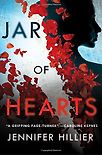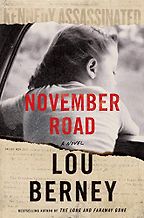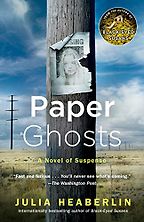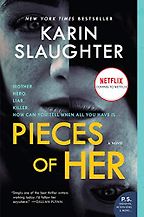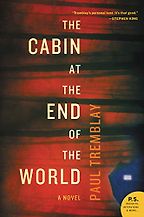You’re in charge of organising the International Thriller Writers’—the ITW’s—Thriller Awards for the best thrillers of 2019. The five books we will discuss today are the titles that made the hardcover book shortlist. But let’s start with the basics. What, in your opinion, makes for a good thriller?
The same thing that makes for any great novel: characters you care about, a plot that grabs you and makes you think and feel, and writing that has voice but doesn’t intrude on the story. But with thrillers, you also want that little bit extra: pages that turn so fast the reader gets paper cuts.
Can you tell me a little bit about the aims of the awards, and how the books are selected?
The aims of the Thriller Awards align with ITW’s purpose: to promote the thriller genre; provide opportunities for collegiality among thriller authors and industry professionals; and bestow recognition for the genre.
As for how the books are selected, every year a notice goes out to our more than 4,000 members soliciting entries for novels and short stories published during the eligibility period. While the number of submissions varies, we typically receive more than 1,000 books or stories in six award categories, which include best hardcover, best paperback original, best first novel, best ebook original, best short story, and best young adult novel. Panels of judges then embark on the difficult task of finding the works that stand out among some very steep competition. It’s always heartening to see the pride and care the judges take to come up with the shortlist.
Get the weekly Five Books newsletter
This year the judges included several past Thriller Award winners and nominees, bestselling authors, journalists, editors, and other members of ITW. The finalists are announced in April of every year, and the winners announced at an awards gala at the ThrillerFest conference held in July.
Before we dive into the books, I wonder if you might touch on terminology a little. I learned recently that librarians consider ‘crime novels‘ and ‘thrillers‘ to be fairly synonymous. Do you agree? And what else does the genre encompass?
I think your question would spawn a great debate at ThrillerFest since many authors have strong views about the definitions and differences between thrillers, mysteries, suspense, and crime fiction. David Corbett wrote a terrific piece about the differences for Writer’s Digest. For the Thriller Awards, we have a big tent and we allow works by ITW members that include elements of any of these categories.
Let’s talk about the 2019 shortlist of books. Firstly: Lou Berney has been shortlisted for November Road, his fourth thriller. This book has been hotly anticipated as his last, The Long and Faraway Gone, won several awards. Can you tell me more about Berney’s new book?
Yes. November Road blew me away. It’s a period piece—not something I’m normally into—set in the aftermath of the assassination of John F Kennedy. A mobster and a young mother intersect as they both are on the run from very different things. It’s crime fiction at its best: heartfelt, thrilling, and leaves you with a lump in your throat.
In an interview, Berney said something that amused me: “I think I gravitated toward crime novels because I have a bit of a criminal mind myself… I had a natural aptitude for thinking of schemes and figuring out how to break rules.” As an acclaimed thriller writer yourself, can you relate?
I love that. I don’t think I have a criminal mind, but a curious one. I think I gravitated toward thrillers because they allow me to explore questions about people. Why do good people do bad things? Why do bad people do good things? Why are we more likely to be killed by someone we love than a stranger? I could go on. But given the success of November Road, maybe I ought to be thinking more like a criminal!
Next, Julia Heaberlin’s Paper Ghosts. Publishers Weekly described this book as “an artful and elegiac psychological thriller.” Can you tell me a bit more about it?
Publishers Weekly got it right, the novel is artful and elegant and—as always with Heaberlin—the setting itself is a character. Like November Road, the story involves a road trip, but this one with a possible serial killer.
A young woman, obsessed with finding who killed her sister more than a decade ago, thinks she’s identified the culprit, an ageing photographer who lives in a halfway house. She’s linked his photos to a string of missing girls. The rub is that the man suffers from dementia. Pretending to be his daughter, the woman takes him on a road trip to try to jog his memory about past crimes. Lyrical prose, characters with hidden agendas, and a non-stop undercurrent of tension make this a must read.
That’s interesting. I’ve enjoyed a number of thrillers—both books and movies—that feature protagonists with memory loss: Memento, The Girl on the Train, Before I Go To Sleep… But this seems a new angle, one that poses some ethical questions about accountability.
Yes, and there are other recent great examples, such as Wendy Walker’s All is Not Forgotten. It’s a testament to the skill of writers who can take a somewhat familiar premise but add a fresh new twist and make it compelling and original. Often the stories focus on the protagonist’s memory, but Heaberlin ratchets up the tension by focusing on the secrets that may, or may not, be locked up in the antagonist’s head.
I love the sound of our next book: Jennifer Hillier’s Jar of Hearts. It’s a psychological thriller about a woman about to testify at the trial of her high school boyfriend. What makes this book stand out?
Great title for a great book. Hillier’s breakout novel is a modern Silence of the Lambs. It centers around Georgina Shaw, whose best friend disappeared when they were teenagers. Fourteen years later, her friend’s remains are found, and Geo’s life as a successful corporate executive is turned upside down when she’s sent to prison for her role in helping her then-boyfriend—now serial killer—commit the gruesome crime. Now she must testify against him. Dark, twisty, and unflinching—and full of teen angst and obsession—it’s no surprise this book has garnered so much acclaim.
Our next author Karin Slaughter needs no introduction, having sold more than 35 million books worldwide. Is Pieces of Her another hit?
I suspect Karin Slaughter doesn’t think much about whether a book will be a hit and just tries to write the best book she can. And, frankly, that’s enough to make a hit. There’s a reason she’s considered one of the greatest crime writers in the world.
“There’s a reason Karin Slaughter is considered one of the greatest crime writers in the world”
The story here starts off with a bang when a mother and daughter are having lunch at a diner when gunshots ring out. To the daughter’s surprise, the mother snaps into action and heroically, and skilfully, puts an end to the carnage. And from there we learn that there’s more to Mom than anyone would have ever expected. Pieces of Her not only has an explosive, intriguing plot, but the characters are what makes it such a standout novel and classic Slaughter.
And that takes us to Paul Tremblay’s new horror: The Cabin at the End of the World. What can readers expect?
I’ll never forget reading Cormac McCarthy’s The Road, and thinking that no one should even try to write an end-of-the-world novel after that. I mean, what would be the point? But then Tremblay comes along with his haunting, literary twist on the home invasion story, with the invaders believing that they are the only ones who can stop an impending apocalypse—by destroying a loving family. It’s tense and obviously original—heartbreaking and uplifting too—and stays with you for a long time after you finish the final page.
That’s great. Thanks so much. I consume a lot of thrillers in the form of audiobooks. I think I’ll line these up for my next road trip! And to close, can I ask: is 2019 a good time for thrillers?
Thank you for the insightful questions and for putting a spotlight on the Thriller Awards. I hope your readers will check out all of this year’s nominated books and short stories.
And to answer your question, yes, absolutely. Many say this is the Golden Age of Television, but I think the books discussed above—and the other works nominated for Thriller Awards—make it clear that we’re living in the Golden Age of Thrillers, written by some of the world’s best writers of any genre.
Interview by Cal Flyn, Deputy Editor
June 6, 2019. Updated: April 29, 2025
Five Books aims to keep its book recommendations and interviews up to date. If you are the interviewee and would like to update your choice of books (or even just what you say about them) please email us at [email protected]
Five Books interviews are expensive to produce. If you've enjoyed this interview, please support us by donating a small amount.

